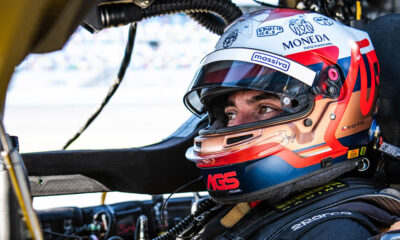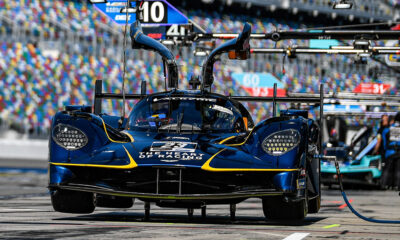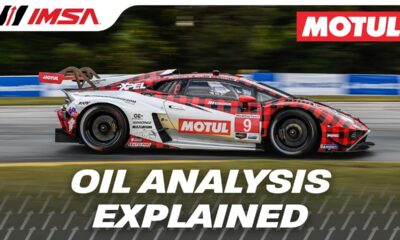
Photo: Mike Levitt/IMSA
IMSA has confirmed plans to introduce hybrid technology in its DPi 2.0 regulations, which appears set to be an evolution based on the current LMP2-based platform, according to VP of Competition Simon Hodgson.
The developments come in the wake of a second DPi Steering Committee meeting held last week at Mid-Ohio, which saw nine manufacturers present alongside representatives from the current constructors, as well as IMSA and the ACO.
Led by Hodgson, Thursday’s meeting explored ways of introducing a form of “mild hybridization” into the current platform as well as increasing manufacturer-specific styling cues to the prototypes.
Hodgson said the proposed measures would open up “additional value” to manufacturers by showcasing better brand recognition, which has been limited in the first-gen ruleset.
“Obviously when DPi was conceived, it was conceived with the intent of having DPis race alongside LMP2 cars,” Hodgson told Sportscar365. “We didn’t want to stray too far away from the efficiency of the base P2 platform and grant too much styling.
“But now as DPi has become a class on its own individually, there’s an opportunity to look at things a little differently as we move towards the next five-year homologation period.”
A large focus in the meeting was placed on the integration of a “tightly controlled” single-supply rear wheel-driven mild hybrid system and how it would be packaged within the current chassis.
Hodgson said that constructors completed sim work to see what’s achievable with the current car, taking into account the increased weight and potential packaging challenges a hybrid system could present.
While Sportscar365 understands that a 48-volt hybrid system, integrated into the powertrain, was discussed, Hodgson said both low and high-voltage systems are on the table.
However, IMSA has ruled out the hybrid system placed on the front axle, to essentially create a four-wheel drive system.
Unlike the multi-million dollar hybrids seen in the FIA World Endurance Championship, the targeted lease cost for IMSA’s proposed unit us understood to be in the range of $100,000.
Hodgson, however, said it would be a “premature” assumption that the current LMP2-based chassis would have to be lengthened in order to package the hybrid system, which some parties have voiced concerns with.
“Right now, for us, the main priority is the packaging and whether or not we can get proof of concept on what we’re doing, which we believe we do. There are no red flags,” he said.
Hodgson stressed that the addition of a mild hybrid unit would be focused on costs, handling and ease of operation to teams, and not necessarily used for a significant performance increase.
“In all the simulation work we’ve done has been to either meet the current performance or add some mild additional performance,” he said. “But we’re talking about an evolution, not revolution.”
He said that as of today, they see DPi 2.0 being based off the current chassis rules.
“We got fully on board with the four constructor model and it’s been successful, certainly in LMP2 and it’s proven to be successful here also,” he said. “There’s been alignment between manufacturers and constructors.
“Why change something that’s working? Nobody wants to start with a clean sheet of paper.
“We’ve really approached it with that in mind, in trying to grow what we have already, not revolutionize it.”
Among the nine manufacturers present in last week’s meeting, Sportscar365 understands it included representatives from Ford, Lexus as well as at least two manufacturers from the Volkswagen Group, which is also not currently represented in DPi.
ACO technical delegate Thierry Bouvet was also present, although Hodgson said there was “no intent” to initially exclude the ACO’s participation from the initial Steering Committee meeting at Daytona in January.
“At that point it was a little bit more conceptional than it is today,” he said.
Hodgson said Bouvet’s presence in Ohio, while during the WEC Spa weekend, was on the grounds of the ACO being the homologation authority for LMP2, which DPi is based off.
Atherton: Continued “Reason for Hope” for Global Prototype Platform
Amid growing questions over the feasibility of FIA and ACO’s ever-changing proposed ‘Hypercar’ formula, IMSA President Scott Atherton has remained firm to his hope that a common global solution can be found.
It comes in the wake of a further delay in the finalization of its top class regulations, which are due to debut in the 2020-21 WEC season, some 18 months prior to the planned rollout of DPi 2.0 at Daytona in 2022.
Representatives from the FIA and ACO declined to comment on the status of Hypercar during last weekend’s WEC event at Spa, amid reports they’re in the midsts of exploring a so-called ‘Plan B’ option.
“I’ve said it before and I’ll say it again. It may be naively optimistic but until I’m convinced there’s absolutely no options yet, I would say yes, there is reason for hope,” Atherton told Sportscar365 when asked about a global platform.
“But that’s not a new statement from me.
“I see the volatility of their regulations and the unsettledness of it as an opportunity.
“Simon and his team have been engaged in a process [for DPi 2.0] that we’re extremely proud of. It has been steady, predictable.
“It has featured a process and protocol that is very reflective of how this organization has been operating for several years now.”
While Hodgson would not directly address the possibility of an adjusted timeline for DPi 2.0 should there be a request from the ACO to utilize the platform, he said there’s “no time to waste” in working through its own pre-defined schedule.
“The general sentiment [from manufacturers] is that it’s a well-structured timeline that should result in a very appropriate regulation,” he said. “All of this has been established based on our target, which is to introduce the car in 2022.
“As far as the political aspect of it, there are discussions that need to occur that are out of my wheel house.
“Should anything change, I guess those things evolve.
“But for us, we’re definitely on a path, there’s a timeline that’s been supported by all of our current partners here in IMSA.”


























